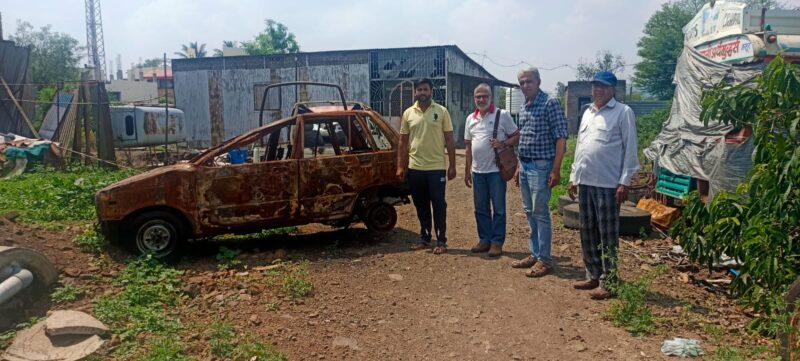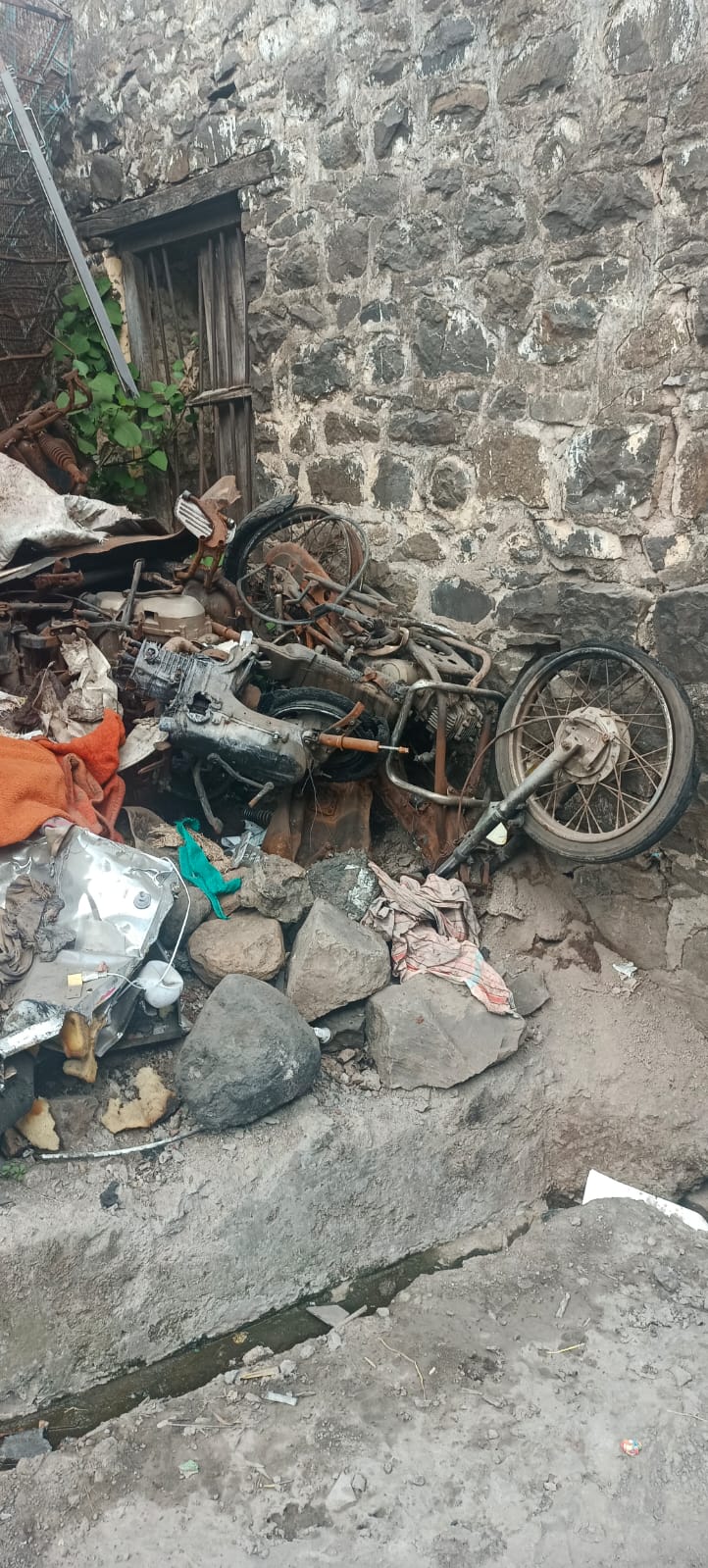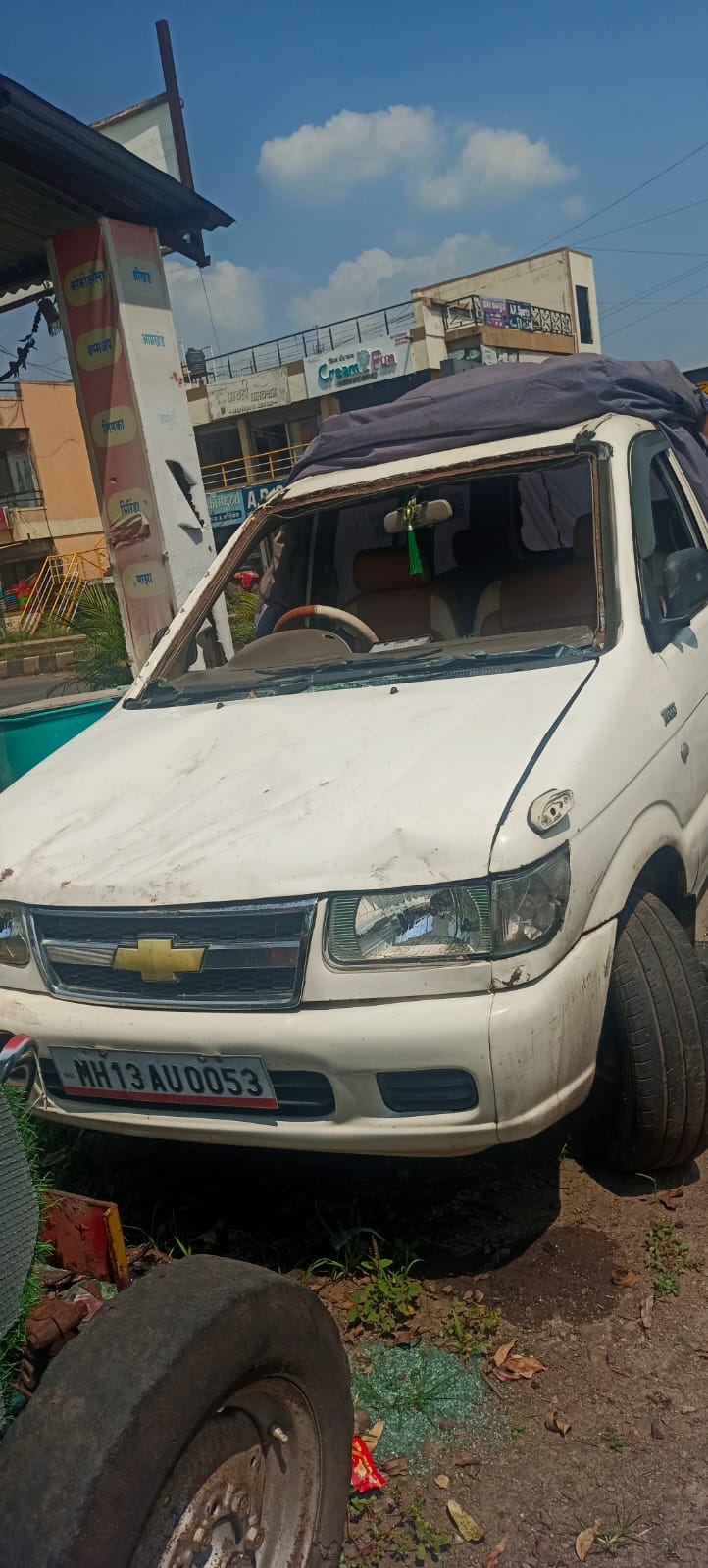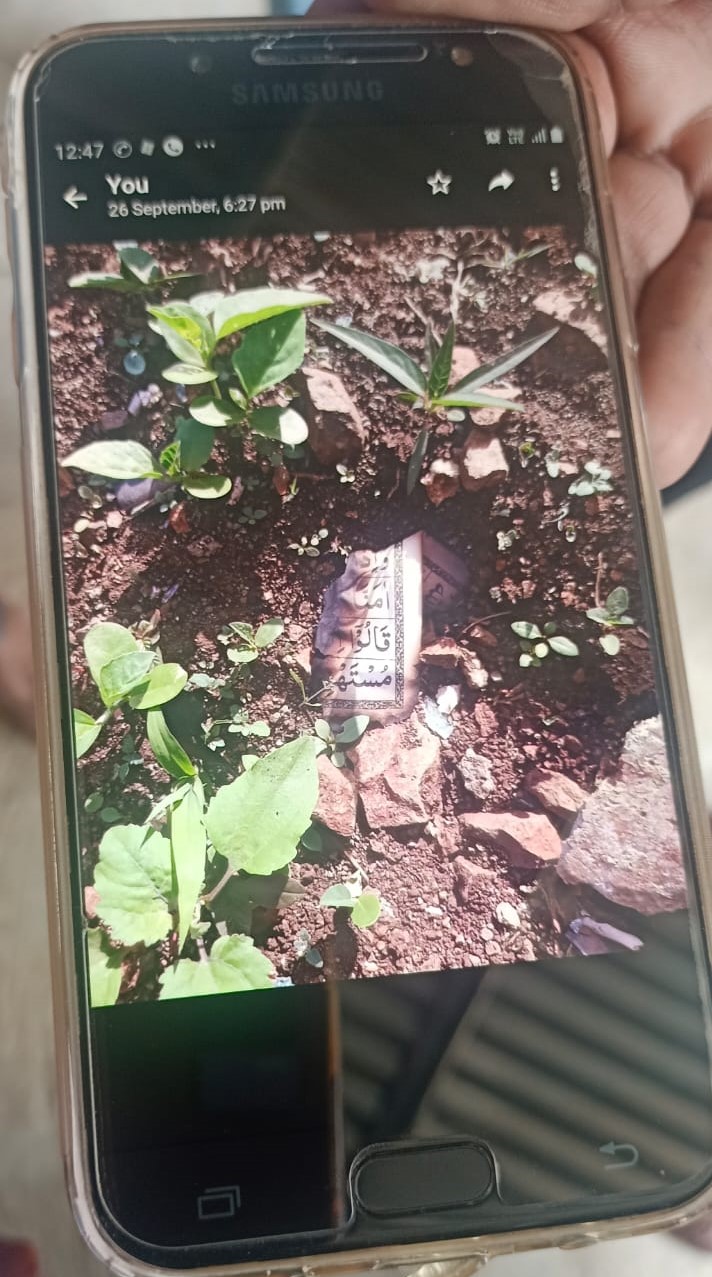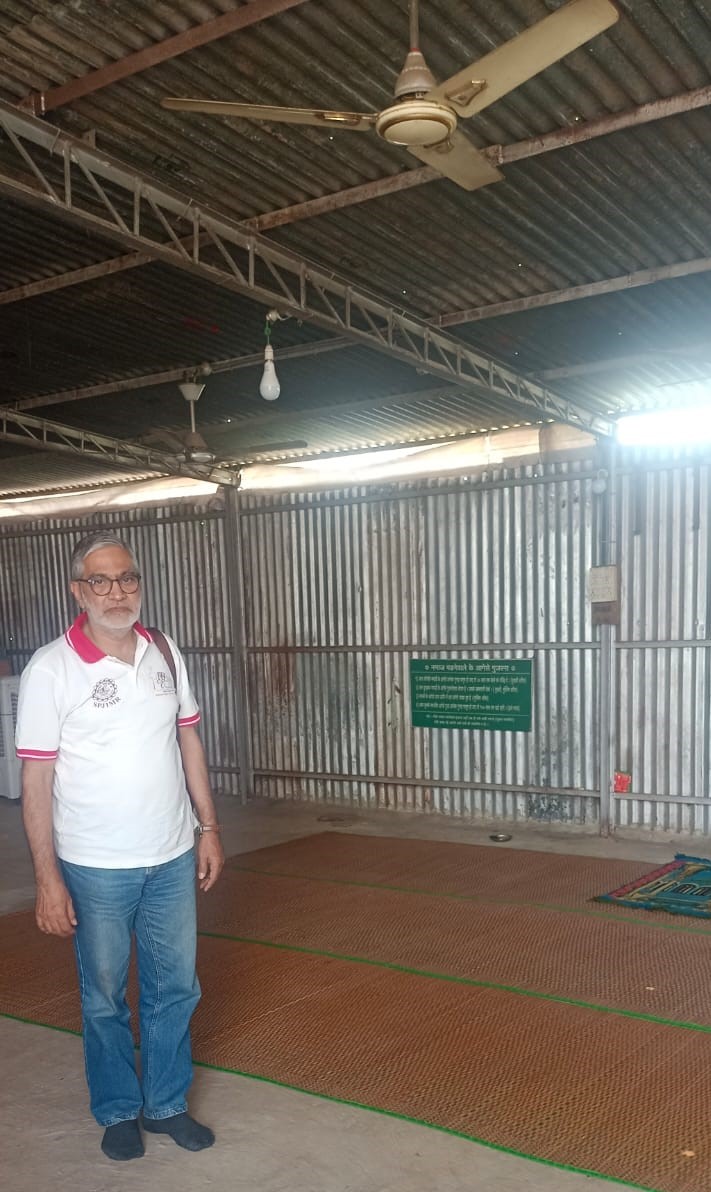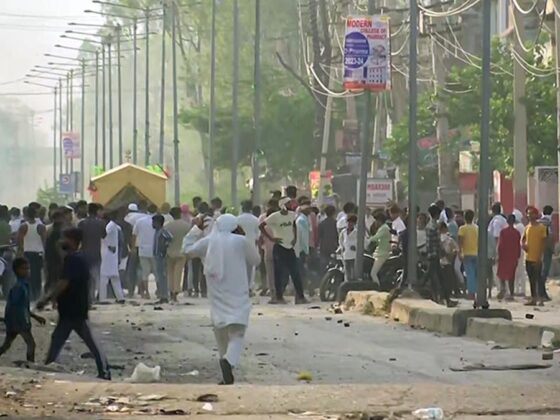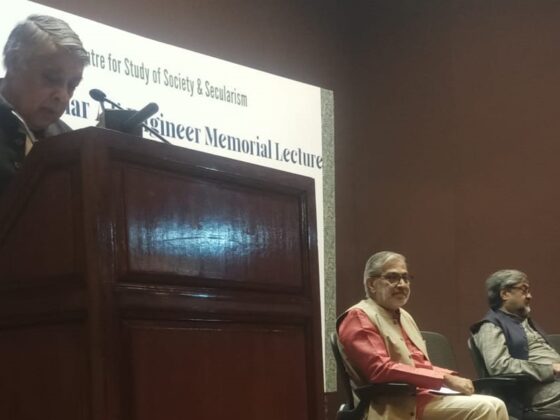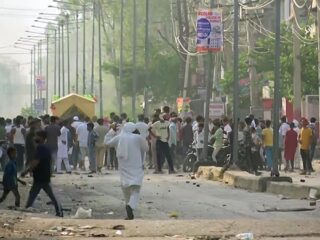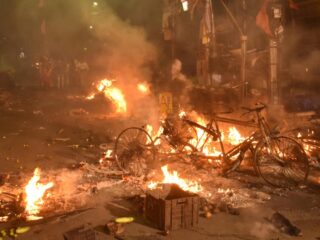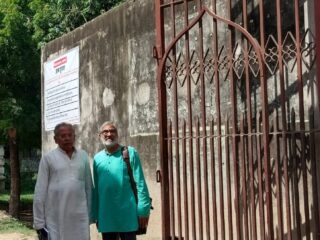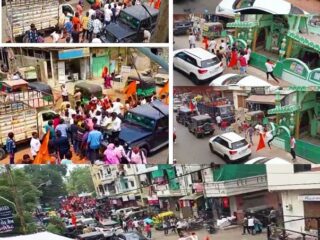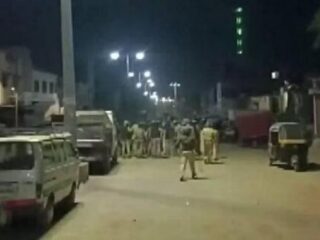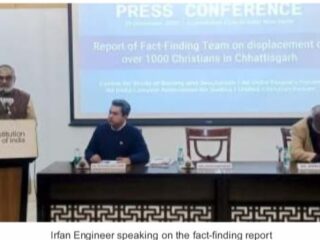26/10/2023
“Landyana marayche ahe” (Kill the ‘landyas’- a derogatory word used for Muslims) was one of the slogans that rented the air as the mob attacked Muslims and properties owned by Muslims in the sleepy Pusesavali village of Satara district in Maharashtra on 10th September, 2023. The mob raised other slogans – “Jai Shri Ram” as it attacked several shops owned by Muslims, vandalized two mosques and torched vehicles outside the Jama Masjid. Nurul Hassan Shikalgar (32) was hit on his head and died on the spot when the miscreants attacked the Jama Masjid in Pusesavali. The targeted attack was attributed to an alleged post uploaded on a social media platform by a Muslim youth which makes derogatory comments about Hindu mythical figure, Sita which allegedly hurt religious sentiments and a second post containing derogatory reference to Shivaji Maharaj. In order to understand this violence, a fact-finding team led by Centre for Study of Society and Secularism (CSSS) visited Satara and Pusesavali on 9th October, 2023. The fact-finding team consisting of Adv. Irfan Engineer, Director of CSSS, Neha Dabhade, Executive Director of CSSS, Aslam Tadsarkar, social activist and Comrade Vijay Nikam, social activist, met survivors of the violence as well as the police authorities.
Background of Satara and the incident:
Satara is a district situated in the western Maharashtra. Western Maharashtra is considered as a developed region owing to the large-scale sugarcane cultivation and cooperative sugar factories. The region historically boasts of the legacy of Shivaji Maharaj which also is marked by his inclusive approach towards Muslims. There is a strong syncretic culture which influences the social fabric of the region, its customs and norms. For instance, the Muslims who form the part of the ‘bara balutedar’ community in the region enjoy a place of honor and are given coconut and a cap (naral ani topi- customary way of felicitation) in the marriage ceremonies of the Hindus. Another example of syncretic traditions in the region is that the animal sacrifice which is offered to the Hindu Goddess is slaughtered only by the Muslims. The Muslims and Hindus together contribute to have the Parayan lunch which is hosted for reading the Dnyaneshwari. Ironically, this lunch was organized by the Muslims of Pusesavali only about a month prior to the attack on them on 10th September, 2023.
The Muslims in Satara and Pusesavali are mostly self-employed and belong to the OBC castes – Qasai (butchers), Shikalgars (who used to sharpen weapons earlier for the armies and now for agriculture & are listed in the Nomadic Tribes category), Bagwans (Mali), Shaikhs, Pathans, Khans and Mujawars (caretakers of Dargahs). The Bagwans form the majority of the Muslims in Pusesavali. The Muslims constitute for a small minority in Pusesavali village (around 100 families) which has a total population of about 10,000.
The relationship between the Muslims and Hindus in Satara and Pusesavali has been characterized by peace and harmony as elaborated above. However, Maharashtra and the Satara region have been simmering with communal incidents in the past few months. It is well documented that there have been a slew of hate speeches targeting the Muslim community delivered in many processions organized by the Hindu right-wing organizations including “Hindu Sakal Samaj” throughout Maharashtra. The hate speeches delivered in the processions which started in November last year in 2022 have led to communal violence in some places including Aurangabad where public property was vandalized. The hate speeches delivered in these processions by the Hindu nationalist political leaders call for genocide against Muslims and their economic boycott. In Pusesavali and adjoining regions, tensions prevailed in the last couple of months owing to alleged objectionable posts on social media platforms to which some individuals decided to take offence.
Right wing organizations, particularly the Shree Shiv Prathisthan Hindustan (SSPH), led by Sambhaji Bhide is active in mobilizing the Hindu communities in the region. In the past, the organization has organized rallies and protest marches all over Maharashtra, including in Satara district. Hate speeches targeting the Muslim community and inflammatory speeches were delivered by its functionaries. Sambhaji Bhide has been booked for hate speeches under IPC sections 153A for making derogatory comments against Mahatma Gandhi, Jyotiba Phule and Gautam Buddha. He was also one of the accused by the Dalit organizations to have instigated attack on Dalits in the Vadhu Budruk, a village near Bhima Koregaon on 1st January 2018 where they had gathered, like every year, to pay their respects to Govind Mahar who performed last rites of the mutilated body of Chhatrapati Sambhaji Maharaj who was killed by Aurangzeb’s forces in 1689.
Ironically, born as Manohar Bhide in a Brahmin family, Bhide took up Shambhaji as his first name to reach out to the Maratha and OBC youth in Maharashtra. Once a RSS activist, Bhide has been mobilizing youth by writing personal postcards to them. In 2008, Bhide was in national spotlight when his followers ransacked theatres protesting against the release of the movie “Jodha-Akbar”. In 2009, he brought his hometown Sangli to a standstill when a Ganesh pandal was denied permission to put up an artiste’s impression of the assassination of Adil Shah’s army commander Afzal Khan by Shivaji Maharaj (Gadgil & Dhupkar, 2018). In Pusesavali and Satara, Shree Shiv Prathisthan Hindustan has been stirring the communal pot through their activists’ aggressive mobilization of Hindu youth and targeting Muslims especially calling for an economic boycott against the Muslims.
The Build up to 10th September:
In June, an alleged Instagram post praising the 18th century ruler of Mysore, Tipu Sultan, allegedly made by teenage Muslim boys angered Hindu outfits in Kolhapur, 100 km from Satara. They went on a rampage, targeting Muslim homes and shops and physically attacking Muslims. On 15th August, a 14-year-old Muslim youth, Shaikh in Satara was arrested for allegedly uploading an objectionable post about Shivaji Maharaj from his social media. His family protested that the post was not uploaded by him and that his social media account was hacked. They alleged that even after he deleted the post, it was again uploaded on the same account, making their suspicion stronger. Yet the youth was sent to a remand home.
Shortly after this post, in August 18, 2023, a derogatory post was allegedly uploaded by a youth from Muslim community, and a complaint was lodged. He was arrested on 18th August itself. A protest rally was organized by right-wing Hindus on 19th August, 2023 in response to the post although the accused was already arrested by the police. Derogatory slogans were given in the protest rally, and the mob threatened the Muslim community holding the entire community responsible for the alleged derogatory post. A complaint against Ashfaque Altaf Hussein Bagwan of Pusesavali, block Khatav, dist. Satara dated Sept 08 2023 was registered at the Aundh police station. Subsequently, Aadil was arrested for the same and was handed over to the police by the members of the Muslim community. He spent 13 days in prison before getting bail. In the meanwhile, a procession was organized on 19th August, by Nitin Veer from SSPH to call for boycott against Muslims and demanded strict punishment against Aadil. The call for boycott was followed leading to drastic fall in small businesses of Muslim vendors and shopkeepers in Pusesavali since the Hindu community actually started buying goods from Hindu vendors and shopkeepers. The boycott has reduced the income of Muslim shopkeepers considerably.
Violence on 10th September, 2023:
On 10th September, there were two posts / comments allegedly from the social media accounts of Altamash and Muzzamil Bagwan. While Muzzamil’s alleged post contained derogatory references to Shivaji, Altamash’s alleged comments contained derogatory comments about Sita. While both were taken by the police for investigation, a mob of approximately 200 to 250 people, some from neighbouring villages like Wadgaon gathered in Datta chowk at around 9.30pm. The mob was allegedly enraged by the alleged posts of Altamash and Muzammil. The mob attacked shops owned by Muslims on their way from Datta chowk to the Jama Mosque. A small mosque which falls on its way was attacked and the Quran in it was burnt. When the mob reached the Jama Mosque around 9.45 pm, the mob torched seven to eight vehicles parked outside the Mosque as well as pelted stones on the shops near it owned by the Muslims. There were around 14 devotees in the Jama Mosque. All of them were beaten up and they sustained serious injuries (details given below). Nurul Hasan Shikalgar who was an engineer and owned earth moving machinery (JCB), was present in the mosque and was attacked on his head fatally leading to his death on the spot. According to eye witnesses, there were not more than 5 to 6 police personnel present at the sites of violence and didn’t help in protecting the property or lives of the Muslims. From 9.30pm to 11pm, the Muslim residents were attacked brazenly. The mob was equipped with sticks, iron rods, petrol, bricks and stones.
The police after the violence have arrested over 38 persons. 3 FIRS are filed related to the violence, one is related to the alleged derogatory post, and the complainant therein is a policeman. The other FIR is related to the murder of Shikalgar u/s 302 of the IPC, and the third FIR is related to attack on police personnel u/s 353 of the IPC. The police have arrested Rahul Kadam from SSPH.
About the alleged Post:
The fact-finding team saw the alleged posts/ comments which triggered the communal riots in Pusesavali. The Hindu right-wing organizations have made posters which include screenshots of the alleged comments along with the pictures of the youth who have uploaded the comments. The picture of the youth has been crossed out with “Jahir Nished” (public condemnation) written in bold on the poster. A red coloured cross mark on the comment of Muzammil in the poster berates the Muslim youth for allegedly uploading objectionable comments against the 17th century Maratha ruler Chhatrapati Shivaji Maharaj. Interestingly, in the same poster there was a derogatory comment on Allah in reply to the comment by Muzzamil. This objectionable comment on Allah by “man_jatt” reproduced via screenshot on the poster circulated by the Hindu right-wing leaves little doubts that these comments were indeed made. The poster was used to mobilize Hindus for the protest march which indulged in rioting as well. The poster that contained the comment by Altamash had derogatory references to Sita and Altamash’s picture crossed out.
Also noteworthy is the fact that these comments were made viral by the Hindu right-wing which reproduced these comments in their posters. While it was widely reported in the media about the derogatory posts on Sita and Shivaji, it was not reported that there was a grossly blasphemous and offensive reference to “Allah” in one man_jatt’s reply to the same comment. Interestingly the friends and family of Muzzamil claim that he didn’t use a phone for the last seven months prior to this incident, raising questions on whose account were these comments made from. Also there was no notification about the comment on the alleged Instagram post, which is normally the case. The Muslim respondents we talked to said that Muzzamil’s phone was hacked by someone, who also deliberately posted the alleged comments/posts without Muzammil’s knowledge. Muzzamil and Altamash’s mobile are in the possession of the police for forensic examination and they have not yet been arrested- in all probability indicating towards lack of evidence against them.
Losses:
It should be stated unambiguously that the fact finding found out that the Muslims whose life and property was attacked had no connection with the alleged derogatory posts or comments to the knowledge rioting mob. The victims that were attacked in the Jama Masjid or whose properties were vandalized in Pusesavali were not even alleged by the mob to have any connection or responsibility for the posts or comments. The mob it seems vented out their angst against the entire community and used the posts as a pretext to inflict collective punishment. They were targeting every Muslim they could lay their hands on, for what they were – Muslim.
Mubeen Bagwan has a mobile shop near Datta chowk in Pusesavali. He saw that a mob was marching towards this shop and house around 9.30pm on 10th September, 2023. He said there were approximately 250- 300 people in the mob. The mob raised derogatory slogans against the Muslims- “Landyana Maraycha”. The mob torched vehicles belonging to Mubeen’s family and also vandalized his mobile shop. The total damages he suffered are to the tune of ten lakhs. Though FIR was filed and panchanama is done, the family doesn’t know if they will receive any compensation.
Mubeen Bagwan informed the team though the team couldn’t verify it themselves, that others whose properties were damaged apart from Altamash Bagwan and Muzzamil Bagwan included
- Ashfaque Bagwan
- Ridz Maner
- Azad Momin
- Tajuddin Bagwan
- Irshad Bagwan
- Rafique Attar
- Rafique Pathan
- Atik Bagwan
- Yusuf Bagwan
Ismail Bagwan:
Ismail Bagwan (33) owns a chicken shop in Pusesavali. On 10th September, 2023, he was in the Jama Mosque when the mob attacked the Mosque around 9.45pm. Bagwan narrated that some of the attackers in the mob were shouting that “Vikram Pawaskar ne bola hai ki ek bhi landya ko zinda nahi rakhna” (Vikram Pawaskar has instructed us not to spare a single Muslim) while attacking around 14 Muslim devotees who were present in the Mosque. Bagwan narrated that the viciousness of the attack indicated that the attack was pre-planned. The perpetrators were armed with petrol, rods, sticks, stones and bricks. Ismail was hit with an iron rod on his hands when he was trying to protect his head from the blows of the rod. He sustained a fracture on his left-hand index finger and his right arm now has an iron rod. His legs are also injured from stones. He said Rahul Kadam, Nitin Veer, Pankaj Watankar were part of the mob. He told the team that others including Adbul Kadir and Jainuddin Mulla who were present at the Mosque were injured and taken to the Krishna Hospital owned by Atul Bhonsale who is associated with the BJP. The hospital didn’t give adequate treatment and also didn’t allow the relatives of Ismail and others to meet the injured. The cost of his treatment was INR 13,000. After coming home from the hospital, Ismail felt pain in his arms and went to another hospital where he was given the right treatment. He paid INR 40,000 in Takle hospital. He is the sole breadwinner in the family. His chicken shop is shut while he is injured since nobody else can run the shop. He rued, “after the announcement of boycott against Muslims, my clients have moved to Kamble who also is a chicken vendor. Earlier I used to do business upto INR 8000 in a day. Now it is down to INR 1000 after the boycott. I can’t even afford to hire anyone to help me since I am not sure I will do enough business”.
The team also visited the house of Nurul Hasan Shikalgar who was murdered in the Jama Mosque. He was hit on his head by the perpetrators from the mob. His wife who is pregnant, and his father haven’t received any compensation. Nurul was the only breadwinner in the family which got its income from operations of the JCB which they owned and dairy farming. His parents are retired. Ayesha, his wife informed the team that the post mortem of Nurul was carried out without their consent at Satara Civil hospital. The police had Nurul’s phone and they deleted all the videos taken by him of the attack, alleged Ayesha.
Interestingly, the vehicles that were burnt right outside of the Jama Mosque by the mob were cleared up by the police even before the panchnama was made. The same was done by the police in the make shift smaller mosque where the mob burnt the Quran. Stones were pelted on ‘Mama’s Collection’ – a cloth Store near the Jama Mosque. Around 9.30pm stones were pelted on the shop which suffered damage of INR 2.5 lakhs. The incident has resulted into depression for the family members of the owners shop. Rafique Pathan, the owner of the store said, “we regularly contribute ‘vargini’ for Hindu festivals and also enthusiastically hosted the Parayan lunch”.
Findings:
The attack was pre-planned:
The attack on 10th September didn’t appear as spontaneous. There are indications that the attack was preplanned. The mob which consisted of youth from the neighbouring villages as was told to the fact-finding team couldn’t have gathered spontaneously. They were mobilized for the violence. The mob was armed with weapons including petrol and iron rods, acquiring which also requires time and planning. The narratives of the victims like Ismail Bagwan indicates that the intent of the perpetrators was to target the Muslims ruthlessly and not sparing their lives. The survivors of the attack also went on to name Vikram Pawaskar as someone who had instructed them to not leave any Muslim alive and local Nitin Kulkarni, Ratnaparkhi as one of the main accused with others as mentioned in the FIR.
The social media posts merely a pretext to target the Muslim community:
The Hindu right-wing in the region of Satara and its adjacent areas has exhibited a notable proclivity for propagating divisive sentiments, thereby engendering an atmosphere fraught with communal discord. Over the past couple of months, these communal tensions have markedly escalated, precipitated by three distinct incidents involving objectionable content disseminated through social media channels. These incidents have, in turn, engendered political mobilization within the ranks of the right-wing, with the (SSPH) being particularly active.
Significantly, there exist substantial uncertainties pertaining to the authenticity and origins of the objectionable social media posts, not only within the general populace but also within the purview of the law enforcement agencies. It appears that the Hindu right-wing has exploited the recent social media posts as a pretext for targeting the Muslim community. There are allegations that they even generate such posts as their objective is to target Muslims. Notably, the resultant mob violence did not discriminate between individuals directly associated with the objectionable content and those who were not. The intent, it appears, was to inflict ‘collective punishment’ upon the entire community. This indiscriminate targeting extended to figures such as Nurul Hasan Shikalgar, as well as other devotees in the Jama Masjid, who were not linked to the aforementioned posts. Furthermore, those whose properties were targeted similarly had no connections direct or indirect with the posts in question. There were not even allegations against them.
Attempt at polarizing by constant churning of hatred:
The occurrence of communal violence in this incident appears to be part of a larger pattern. It is not coincidental that this incident follows a series of hate processions, calls for the social and economic boycott of Muslims, and derogatory posts, allegedly made by Muslim youth, which are exploited to mobilize Hindu youth by right-wing Hindu groups. This pattern suggests a systematic effort to spread hatred and polarization.
Right-wing Hindu groups, in particular, have been actively promoting hatred through processions and statements by their leaders. This continuous dissemination of hate has contributed to the development of an ecosystem of animosity and division within the society.
Leaders like Vikram Pawaskar from Pusesavali have been identified by the mob as the driving force behind the violence. It is important to recognize that the incident in Pusesavali should not be viewed in isolation; it is connected to a broader agenda of right-wing Hindu groups aimed at polarizing society. This agenda often involves portraying Muslims as those who hate the Hindu religious symbols, further fueling tension and “othering” of this community. They right-wing Hindus strive to represent Muslims as “jihadis” – violent and intolerant of any religion other than Islam. The attempts to polarize have been intensified for electoral outcomes in the impending elections by the politicians belonging to the ruling regime as their only hope to campaign for votes as protectors of the Hindu interests and save them from intolerant Muslims.
Failure of intelligence by police and lapses:
The police’s failure to anticipate and prevent the impending violence in Pusesawali is a matter of concern. Despite simmering tensions and a series of hate speeches delivered by leaders of the Shree Shiv Pratisthan Hindustan, a Hindu nationalist organization, and the BJP, which should have alerted the police to the potential for violence. Their response was inadequate. And the charge was taken by the newly posted API on the night of September 10, at around 10 pm as informed by the API himself to the fact-finding team. Shockingly, there were reportedly fewer than six police personnel present during the outbreak of violence, according to the Assistant Police Inspector (API) himself.
Moreover, Altamash and Muzammil, were detained for questioning but not arrested. It is particularly ironic that Muzammil hadn’t used a phone for the past seven months prior to the alleged derogatory post/comment.
The fact that API Mr. Walvekar assumed his duty only at 10 pm on September 10th, the very day of the incident, under the jurisdiction of the Aundh police station, adds to the perception of a delayed response. The police appeared unprepared while the mob was freely targeting innocent people for about one and half hours. Police reinforcement arrived by 10.45 pm and by 11.00 pm the crowd melted into the dark without any arrests being made on the spot.
Additionally, the hasty clean-up of the mosques after the attack, even before the panchanama could be completed, raises doubts about the police’s investigation. It suggests the possibility of an attempt to remove evidence that could be used against the perpetrators. The community and concerned individuals should seek transparency and accountability in the police’s handling of this situation, as it is essential to ensure justice, and in order to prevent future incidents, and maintain trust in law enforcement agencies.
Derogatory comments about Allah too:
The poster used by the right-wing to mobilize the Hindus against the alleged derogatory post and comment allegedly by Muzzamil Bagwan also contains derogatory and blasphemous reference to ‘Allah’ by way of comment by Man_jatt. While the media and the administration only highlighted the alleged posts, which refers to Sita and Shivaji in objectionable terms, there is complete silence on the comment which maliciously insults Allah so as to outrage the religious feeling of the Muslim community. Why no action is being taken against the author of this post/comment which also hurts the religious sentiments of a group of residents? The police are rightly looking into alleged objectionable posts that are derogatory towards Sita and Shivaji, the same treatment should be given to the post which is derogatory towards Allah. There should be no discrimination.
Impending elections:
The communal violence in Pusesavali can be attributed to the impending legislative assembly elections in Maharashtra as well as at union level. Geographically, Pusesavali is the last village of Satara district on road to Sangli district. Any polarizing action in Pusesavali would influence opinions in both the districts. The incumbent MLA from the North Karad Assembly constituency is from the Nationalist Congress Party (Sharad Pawar). The ruling BJP presumably stands to gain from the resulting polarization caused by the riot and overall hatred spread against Muslims. A section of Hindus in the village did practice the economic boycott against the Muslims to a large extent on the call given by right wing. The mob consisting of youth from the neighbouring villages shows the depth of political mobilization of the Hindu right wing in the region. The relationship between Hindus and Muslims that were once marked with warmth and fraternity is now sour and some amount of communal divide has crept in. There has been little dialogue between the two communities after the violence.
Recommendations:
- Impartial probe into the communal violence
A lapse in the intelligence-gathering capabilities of the local police became evident, as they failed to anticipate the imminent outbreak of violence in spite of the social media being extensively deployed for mobilization by the right-wing Hindu groups. Consequently, their investigative efforts have not instilled confidence among the survivors of the communal violence in Pusesavali. Although several arrests have been made, there persists a pervasive belief among the local residents that the principal instigators of this premeditated violence have not yet apprehended. It is imperative to conduct an unbiased inquiry into the orchestration of this planned violence, with the primary objective being the identification and arrest of the individuals responsible for inciting this violence and mobilizing the mob.
Simultaneously, it is commendable that the authorities are rigorously scrutinizing the derogatory posts concerning Sita and Shivaji Maharaj. Equally, the post involving derogatory content related to Allah warrants cognizance as well. This investigative process should be marked by impartiality and free from any influence or favoritism based on religious affiliations. The impartiality of the probe is of utmost importance to ensure that justice is served without any prejudice related to religion. Ensuring an impartial investigation is of paramount significance to guarantee that justice is dispensed without any prejudice rooted in religious considerations.
- Adequate and fair compensation to the victims of the violence
The Muslim community has endured significant property damage, with some members suffering severe injuries, and a tragic loss of life, exemplified by the murder of Shikalgar. In light of these distressing circumstances, it is imperative that appropriate compensation is provided to the affected individuals and families, commensurate with the compensation awarded to Hindu victims in other regions affected by similar communal riot. This underscores the urgent requirement for a standardized policy on compensation in instances of communal riots, ensuring equitable treatment and redress for all affected parties, regardless of their religious affiliations. Such a uniform compensation policy can contribute to fostering a sense of fairness and justice within the community and promote social cohesion during times of communal tensions. Also, the gross neglect and acting upon only after the tragic events by the law enforcement agency is a matter of serious concern for which no excuse be entertained and erring officers should be brought to book.
————————————————————–
Centre for Study of Society and Secularism
Mumbai.

